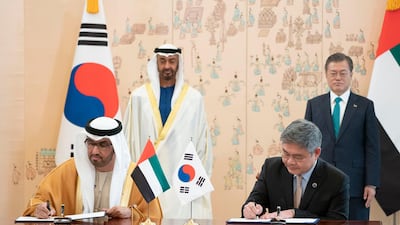Abu Dhabi National Oil Company awarded SK Engineering & Construction a Dh4.4 billion contract to build the world's largest single-site underground crude storage facility in Fujairah.
The South Korean company won an engineering, procurement and construction contract to erect three underground storage caverns with a capacity of 14 million barrels each, deep below ground level, Adnoc said in a statement on Wednesday.
"Construction of the world’s largest single underground project ever awarded for oil storage will enhance the UAE’s energy security," said Adnoc group chief executive and UAE Minister of State Dr Sultan Al Jaber.
"Developing this strategic oil storage mega facility in Fujairah will also support and further enable our broader trading ambitions, strengthening our ability to respond efficiently and competitively to the needs of our customers, while also providing Adnoc with greater flexibility to proactively respond to market needs and commercial opportunities."
Abu Dhabi, which accounts for 4.2 per cent of global crude production, has been increasingly engaging with its Asian customer base, by either awarding upstream concessions or locking in market share through long-term deals.
South Korea is the fifth-largest importer of crude and condensate in the world and is highly dependent on shipments from the Middle East. Of the 3 million barrels per day it imports, 82 per cent is from the Middle East, with 11 per cent supplied by Adnoc alone.
Fujairah, just outside the congested Strait of Hormuz, is being developed as an alternative to the waterway and has the capacity to handle as much as 60 million barrels of crude and oil products.
When completed in 2022, Adnoc's underground facilities could store up to three different types of crude, allowing the state firm increased flexibility to export via the Arabian Sea terminal in the emirate.
"Fujairah is a strategic location because it's already a large oil storage hub, the world's second largest bunkering port, has access to the Indian Oceanand is the terminus of the Habshan pipeline," said Robin Mills, chief executive at Qamar Energy.
The storage would provide Adnoc with a buffer against interruptions in exports caused by weather, technical problems or security issues and help maintain steady deliveries to customers, he added.
"Oil storage can be profitable and it also allows flexibility in deliveries to help meet changing Opec limits without having to vary production too quickly," said Mr Mills.
Around Dh2.2bn of the contract value is expected to flow back into the UAE economy, providing additional stimulus to the country's products, services, manufacturing and assembly as well as infrastructure sectors, Adnoc said.
The agreement was among many signed during the official visit of Sheikh Mohamed bin Zayed, the Crown Prince of Abu Dhabi and Deputy Supreme Commander of the UAE Armed Forces, to South Korea. Other deals that were announced include agreements across the value chain in upstream, downstream as well as bunkering.
The Abu Dhabi producer signed an agreement with Korea Gas Corporation, the world's second-largest buyer of liquefied natural gas, which has conducted a feasibility study on LNG bunkering in Fujairah.
Korea National Oil Company, which has a 30 per cent stake in Adnoc-owned Al Dhafra Petroleum Company, in another agreement said it was looking to increase oil storage by 24 million barrels until 2025. An agreement was also signed with GS Energy, an independent Korean energy firm, which has a 10 per cent stake in Al Dhafra Petroleum as well as a three per cent interest in Adnoc Onshore.
These partnerships were of great significance to both South Korea and Adnoc in terms of securing energy security as well as market share, said Iman Nasseri, managing director of Middle East at London-based Facts Global Energy.
"Adnoc is trying to expand its presence (market share) in Korea, a country that has long been known as strategic partner with Saudi Aramco," he said.
"With the new Adnoc strategy plan in place, to expand its upstream and downstream oil and gas (and LNG), they certainly need Korean companies in their upstream projects and Korea as a market for their downstream and LNG expansion plans."

